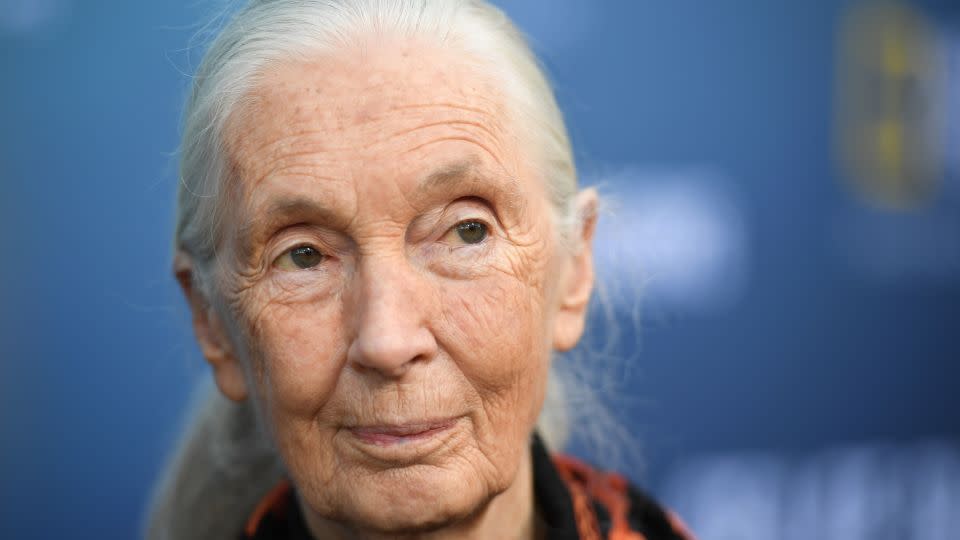Jane Goodall is world-famous for her work with chimpanzees. Now her focus turns to a different crowd
Editor’s Note: Call to Earth is a CNN editorial series committed to reporting on the environmental challenges facing our planet, together with the solutions. Rolex’s Perpetual Planet initiative has partnered with CNN to drive awareness and education around key sustainability issues and to inspire positive action.
In 1960, on the banks of Lake Tanganyika, Tanzania, one young British woman would set out to change what we know about primates forever.
Jane Goodall defied conventional scientific methods by immersing herself in the jungle, which led to groundbreaking discoveries about chimpanzees; most notably that they use tools, are omnivores and that they are socially complex beings.
More than six decades later, her unorthodox field work – and her conservation efforts – are still celebrated around the world.
Today, the recently-turned 90-year-old’s work looks a little different – taking place mostly indoors, and with a different crowd. Through her program called “Roots & Shoots,” Goodall empowers young people to create change within their communities. And for her, this work is just as significant.
CNN spoke with Goodall recently during a trip to South Africa, where she observed some of the projects local Johannesburg students are heading up as part of Roots & Shoots.
The following interview has been edited for length and clarity.
CNN: The younger generation has so much they can learn from elders. Who made an impact on your life?
Goodall: I think it’s really important, this exchange of information from the elders to the youngers. I was really lucky; I had an amazing mother. I was born loving animals, and she supported that love of animals. I was one-and-a-half years old, and she came into my room and she found I’d taken a whole handful of wriggling earthworms into my bed. Most mothers would’ve [said], ‘Oh, throw these dirty things [away].’ She just said, ‘Jane, I think they might die without the Earth, you better take them into the garden.’ And so she nurtured this inherent love I had … in all the insects, the birds, the animals, everybody around me.
CNN: Roots & Shoots is active in 70 countries, where hundreds of thousands of young people are making an impact within their communities. How did the program come about?
Goodall: When I began Roots & Shoots in Tanzania in 1991, it was because I was meeting young people then who had lost hope. Young people who felt we’d compromised their future. And the reason they’re losing hope, it’s obvious: climate change, loss of biodiversity. I could go on listing, listing, listing … but when they said there was nothing they could do about it, then I thought, ‘No, that’s not true.’
We worked out that Roots & Shoots’ main message [would be that] every individual has a role to play. And that we needed to think holistically in terms of helping the environment, people and animals, because we are all interrelated. That’s where it began.

CNN: What is the most important message to convey to the younger generation?
Goodall: The goal that I have is helping young people understand that there is a window of time [to save the planet]. Unfortunately, today I [still] meet more and more people who are losing hope. So many people feel helpless and hopeless because [they question] what can they can do as an individual.
But what people have to understand is when it’s 2 million, 1 billion, 2 billion, 3 billion, all taking small actions to make the world a better place, that is changing the world. What matters is people understanding that as an individual, what they do makes a difference. Not because it’s just them, but because they are not alone.
CNN: Does climate innovation and technology give you hope?
Goodall: Yeah, I think that if we look around at what’s happening to the planet, we need to grab onto every single thing we can that will help us to move forward out of the disaster that we have created. And if we look at solar energy, if we look at wind energy and the power of tide energy, then these things are good.
The problem has been to get government support. So governments tend to put money into the fossil fuel industry, rather than to support the new emerging technologies that will enable us to live in a more harmonious way with the natural world. If we don’t do that, our future is doomed. And unfortunately, it’s not only our future, but so many of the other animals that so many of us love. We have to take action now.
CNN: What message do you have for the world?
Goodall: A message to the world would be, don’t forget that you as an individual make an impact on the environment every single day. And it’s up to you to choose what sort of impact you make. I think once everybody understands the role that they play, whoever they are, is so desperately important, then we move towards a better world.
For more CNN news and newsletters create an account at CNN.com
